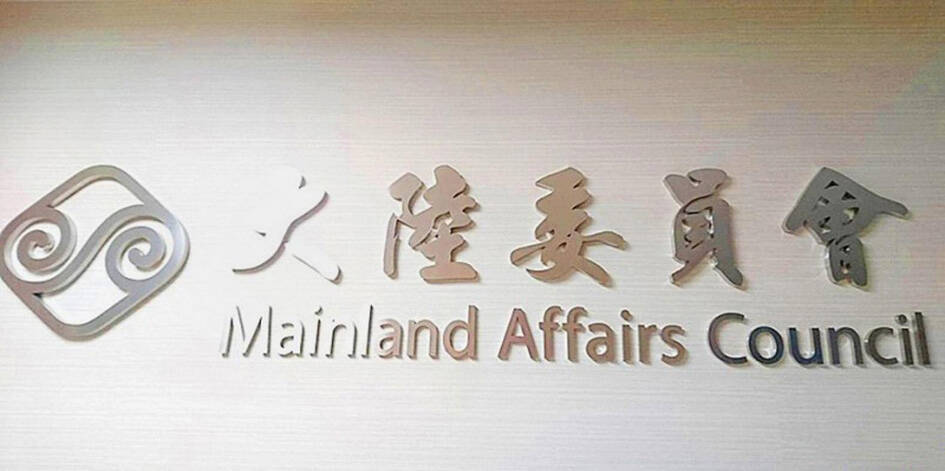The Mainland Affairs Council (MAC) said yesterday the “benefits after unification” touted by Chinese authorities at a Beijing event marking “the 80th anniversary of Taiwan’s restoration to China” hold no appeal for the people of Taiwan.
“The crux of cross-strait relations lies in systemic differences, and the Chinese Communist Party’s (CCP) so- called ‘benefits after unification’ hold no appeal for the people of Taiwan,” the MAC said in a news statement.
Chinese authorities are attempting to unilaterally map out a blueprint for unification and tout its benefits in order to “entice unification,” the MAC said.

Photo: Chung Li-hua, Taipei Times
“We believe the essence of cross-strait relations is a contest of systems, where democracy and authoritarianism cannot be reconciled,” it added.
MAC’s statement came after Chinese authorities held a gathering in Beijing to commemorate “the 80th anniversary of Taiwan’s restoration to China” on Oct. 25, which the Taiwanese side refers to as “Taiwan Retrocession Day.”
To the Republic of China (ROC) government, “Taiwan Retrocession Day” commemorates the transfer of control of Taiwan proper and the Penghu Islands from Japan to the ROC on Oct. 25, 1945, after 50 years of Japanese colonial rule.
That transfer date was nearly four years before the founding of the People’s Republic of China (PRC) on Oct. 1, 1949.
A number of highest-ranking CCP officials attended the Beijing event, including Wang Huning (王滬寧), chairman of the National Committee of the Chinese People’s Political Consultative Conference, and Foreign Minister Wang Yi (王毅).
In his remarks, Wang Huning said that after “peaceful unification,” Taiwan would have the backing of a “powerful motherland” and that seven areas in Taiwan would “be better,” according to a report by the Chinese-language newspaper United Daily News.
Those areas, the report said, include economic development, energy and resource security, and security guarantees.
Wang Huning also said that designating Oct. 25 as “Commemoration Day of Taiwan’s Restoration” -- a designation announced Friday -- can consolidates the international community’s adherence to “the broad consensus that there is only one China in the world and that Taiwan is an inalienable part of China.”
Despite the ROC government’s relocation to Taipei in late 1949 at the end of the Chinese Civil War, Taiwan and the outlying islands of Penghu, Kinmen and Matsu remain under ROC control to date and have never been ruled by the PRC.
As 2025 marks the 80th anniversary of the end of World War II, the ROC and the PRC have clashed multiple times this year over who led in the Second Sino-Japanese War and over commemorations such as Sept. 3 Victory over Japan Day and Oct. 25 Taiwan Retrocession Day.
On Oct. 17, MAC Minister Chiu Chui-cheng (邱垂正), said in a video statement that Chinese authorities have “fabricated the false narrative that Taiwan belongs to the PRC” in recent years -- an attempt, he said, “to eliminate the ROC and annex Taiwan.”
Describing Beijing’s events marking Taiwan Retrocession Day as “united front activities,” he said the Taiwanese government has banned public officials at the central and local levels, as well as faculty and staff at schools at all levels, from attending those events organized by Chinese authorities.

A strong continental cold air mass is to bring pollutants to Taiwan from tomorrow, the Ministry of Environment said today, as it issued an “orange” air quality alert for most of the country. All of Taiwan except for Hualien and Taitung counties is to be under an “orange” air quality alert tomorrow, indicating air quality that is unhealthy for sensitive groups. In China, areas from Shandong to Shanghai have been enveloped in haze since Saturday, the ministry said in a news release. Yesterday, hourly concentrations of PM2.5 in these areas ranged from 65 to 160 micrograms per cubic meter (mg/m³), and pollutants were

Taiwan’s armed forces have established response protocols for a wide range of sudden contingencies, including the “Wan Chun Plan” to protect the head of state, the Ministry of Defense (MND) said today. After US President Donald Trump on Saturday launched a series of airstrikes in Venezuela and kidnapped Venezuelan President Nicolas Maduro, concerns have been raised as to whether China would launch a similar “decapitation strike” on Taiwan. The armed forces regularly coordinate with relevant agencies and practice drills to ensure preparedness for a wide range of scenarios, Vice Minister of National Defense Hsu Szu-chien (徐斯儉) told reporters before a

EVA Airways on Saturday said that it had suspended a pilot and opened an investigation after he allegedly lost his temper and punched the first officer several times as their plane was taxiing before takeoff at Los Angeles International Airport. According to a report published on Thursday by The Reporter, the incident occurred after the flight’s Malaysian first officer tried to warn the Taiwanese pilot, surnamed Wen (文), that he was taxiing faster than the speed limit of 30 knots (55.6kph). After alerting the pilot several times without response, the first officer manually applied the brakes in accordance with standard operating

Japanese Councilor Hei Seki (石平) on Wednesday said that he plans to visit Taiwan, saying that would “prove that Taiwan is an independent country and does not belong to China.” Seki, a member of the Japan Innovation Party, was born in Chengdu in China’s Sichuan Province and became a naturalized Japanese in 2007. He was elected to the House of Concilors last year. His views on the Chinese Communist Party (CCP) — espoused in a series of books on politics and history — prompted Beijing to sanction him, including barring Seki from traveling to China. Seki wrote on X that he intends